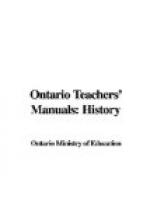4. The reading to the class of accounts of events written by people living at the time will give an atmosphere of reality and human interest to the events. For example, a story of early pioneer days told by a pioneer gives a personal element (see Pioneer Days, Kennedy); a letter by Mary Queen of Scots, to Elizabeth (see p. 143), will make both of these queens real living people, not mere names in history. (See Studies in the Teaching of History, Keatinge, p. 97, also selections from The Sources of English History, Colby, p. 163.) Not much of this may be possible, but more use might easily be made of such materials, especially with the early history of Ontario.
5. The use of local history and of current events will be treated elsewhere. (See pp. 49, 51.)
6. When possible, let the pupils form their idea of an historical person from his actions and words just as we form our estimate of each other, instead of having them memorize mere summaries of his character before they know his actions.
7. Genealogical and chronological tables, written on the black-board and discussed with the class, will be of service in understanding certain periods, such as the Wars of the Roses, and in helping to form the time-sense of pupils. (See Chronological Chart, p. 128.)
8. Chief dependence must be placed, however, on increasing the pupil’s knowledge of present-day conditions in agriculture, commerce, transportation, manufactures, in fact, in all social, economic, and political conditions, in order to enable him by comparison to realize earlier methods and ways of living. The pupil who understands best how we do things to-day can understand best the state of affairs when people had to depend on primitive methods, and can realize how they would strive to make things better.
ON MEMORIZING HISTORY
History is usually called a “memory” subject, and is accordingly often taught as a mere memorizing of facts, names, and dates. The following statement of the chief principles of memorizing will, it is hoped, put mere verbal repetition in its proper place. Interest is the chief condition for teaching history in the public schools, in order that the pupils may acquire a liking for the subject that will tempt them to pursue their reading in after years; without that interest, the small amount of historical fact they can accumulate in their school-days will be of little real value to them when they become full-fledged citizens. In fact, through this emphasis on interest instead of verbal repetition, the pupils are likely to obtain a better knowledge of history and, at the same time, will have a chance to develop, in no slight degree, their powers of judgment.
1. Memory depends on attention; we must observe attentively what we wish to remember. In history, attention may be secured by making the lessons interesting through the skill of the teacher in presenting the matter vividly to the pupils; also by using means to make history real instead of having it a mere mass of meaningless words. (See p. 34.)




